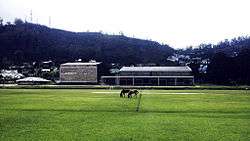Nuwara Eliya Racecourse
 Nuwara Eliya Town Hall and Racecourse Ground | |
| Location | Nuwara Eliya, Sri Lanka |
|---|---|
| Coordinates | 6°57′47″N 80°46′09″E / 6.96306°N 80.76917°ECoordinates: 6°57′47″N 80°46′09″E / 6.96306°N 80.76917°E |
| Owned by | Sports Ministry |
| Date opened | 1875 |
| Course type | Flat |
| Notable races |
|
Nuwara Eliya Racecourse in Nuwara Eliya, Sri Lanka is the only remaining horse racing venue in Sri Lanka.[1] Situated 1,868 metres (6,129 ft) above sea level the race course is one of the highest in the world. The track has a circumference of 1,800 metres (5,900 ft) (approx. 9 furlongs) with a 333-metre straight.
History
John Baker, the brother of Samuel Baker, is credited for introducing horse racing to Nuwara Eliya,[2] when in the 1840s he created a training course for his imported English thoroughbreds on a hill close to his home.[3]
The inaugural race meeting at Nuwara Eliya was held in 1875[4] and was organised by the Nuwara Eliya Gymkhana Club. These meetings carried on intermittently until 1900 when the current race course was laid out.[5]
In 1910, in a meeting presided over by the Governor of Ceylon, Sir Henry Edward McCallum (1852–1919),[6] it was resolved that the Colombo-based Ceylon Turf Club would be in a better position to manage the Nuwara Eliya course and the race meets, as it had greater financial clout, the ability to offer better prizes and was able to make improvements to the course and its buildings.[7] The upper tiers of the modest but historic grandstand housed the race stewards, members and other assorted VIPs, giving them the best view over the course. Outside of the racing calendar, the town library was located in the ground floor of the grandstand. Horse racing in Sri Lanka peaked in the 1950s.[8][9]
In 1956 horse racing was banned in Sri Lanka,[10][11] with the historic Colombo Racecourse in Cinnamon Gardens, Colombo together with the Nuwara Eliya course both closing.[12][13] The Colombo Racecourse was subsequently converted into an international rugby venue, so when horse racing returned to Sri Lanka in 1981[14] the Nuwara Eliya Race Course became the only surviving race track in the country.[12][15][16]
In August 2011, the Sports Ministry took over the ownership of the Nuwara Eliya Racecourse from the Sri Lanka Turf Club.[1] The racecourse is now managed by the Sugathadasa National Sports Complex Authority,[17] with race meetings being conducted by the Sri Lanka Turf Club.
Races
Five horse racing meets are held in Nuwara Eliya during the April season. Meets are also held in August and December. The most prestigious race being the Governor's Cup,[18][19] a 9 furlong race for Class I thoroughbreds,[5] which is held on the Sinhalese New Year (generally 14 April)[16][20] and was first contested in 1833.[21]
| Month | Race | Distance | Category |
|---|---|---|---|
| Feb | Independence Cup | 1,800m (9 furlongs) | Class I thoroughbreds |
| Apr | Governor's Cup | 1,800m (9 furlongs) | Class I thoroughbreds |
| Queen's Cup | 2,000m (10 furlongs) | Class II thoroughbreds | |
| Sunquick Cup | 1,400m (7 furlongs) | Class I thoroughbreds | |
| Aug | Brown's Cup | 1,400m (7 furlongs) | Class I thoroughbreds |
| Dec | Prime Cup | 1,400m (7 furlongs) | Class I thoroughbreds (handicap) |
References
- 1 2 de Silva, Channaka (8 August 2011). "Sports Ministry takes over Nuwara Eliya Race Course". Daily Mirror. Retrieved 29 September 2014.
- ↑ De Silva, Rajpal Kumar (Ed) (1998). 19th Century Newspaper Engravings of Ceylon-Sri Lanka. Serendib Publications. p. 275. ISBN 9780951071021.
- ↑ Anderson, Roseanne Koelmeyer (30 March 2008). "Nuwara Eliya Comes Alive! – Celebrating the 122nd year of the Governor's Cup". Sunday Observer. Retrieved 29 September 2014.
- ↑ R. K. Radhakrishnan, R. K. (15 April 2012). "Colombo shifts to Nuwara Eliya as season begins". The Hindu. Retrieved 29 September 2014.
- 1 2 Palipane, Russell (11 April 2013). "It's time for horses and jockeys to enthrall the crowd". The Island. Retrieved 29 September 2014.
- ↑ Blaze, L. E. (1938). History of Ceylon. Asian Educational Services. pp. 247–248. ISBN 9788120618411.
- ↑ De Silva, G. P. S. Harischandra (1978). Nuwara Eliya, the Beginnings and its Growth. Ministry for Information. p. 97.
- ↑ "Caders promote and foster Sri Lanka Turf Club". The Island. Retrieved 30 September 2014.
- ↑ "Australians Among Best Jockeys In Ceylon". The Argus. Melbourne: National Library of Australia. 21 May 1949. p. 39. Retrieved 30 September 2014.
- ↑ Wijesinghe, Mallory E. (1976). The economy of Sri Lanka, 1948–1975. Ranco. p. 15.
- ↑ "Sports Betting Online in Sri Lanka". AsiaBet.org. Retrieved 30 September 2014.
- 1 2 Gunawardena, Charles A. (Ed) (2005). Encyclopedia of Sri Lanka. Sterling Publishers. p. 183. ISBN 9781932705485.
- ↑ "The Colombo Racecourse: A New Beginning Without Horses". Serendib. Sri Lankan Airlines. December 2012. Retrieved 30 September 2014.
- ↑ Asiaweek, Volume 7. Asiaweek Limited. 1981.
- ↑ Tribune. 25. Ceylon News Service. 1981. p. 69.
- 1 2 Greve, Sandra (10 October 2013). "The Hills are Alive". The Horse Riders Journal No.9.
- ↑ Dole, Nilma (25 December 2011). "Many programs to promote sports in Sri Lanka". Sunday Observer. Retrieved 30 September 2014.
- ↑ Dwight, Richard (3 April 2003). "'Governor's Cup' to boost N'Eliya Holiday Season". Daily News. Retrieved 30 September 2014.
- ↑ Imtiaz, Zahrah (21 April 2014). "Overlooked Heroes". Ceylon Today. Retrieved 30 September 2014.
- ↑ Amit, Naushad (13 April 2014). "Mr. Majestic will face tougher times". Sunday Times. Retrieved 30 September 2014.
- ↑ Amit, Naushad (13 April 2008). "Hi-Gorgeous favourite for Hilton Governor's Cup". The Nation. Retrieved 30 September 2014.